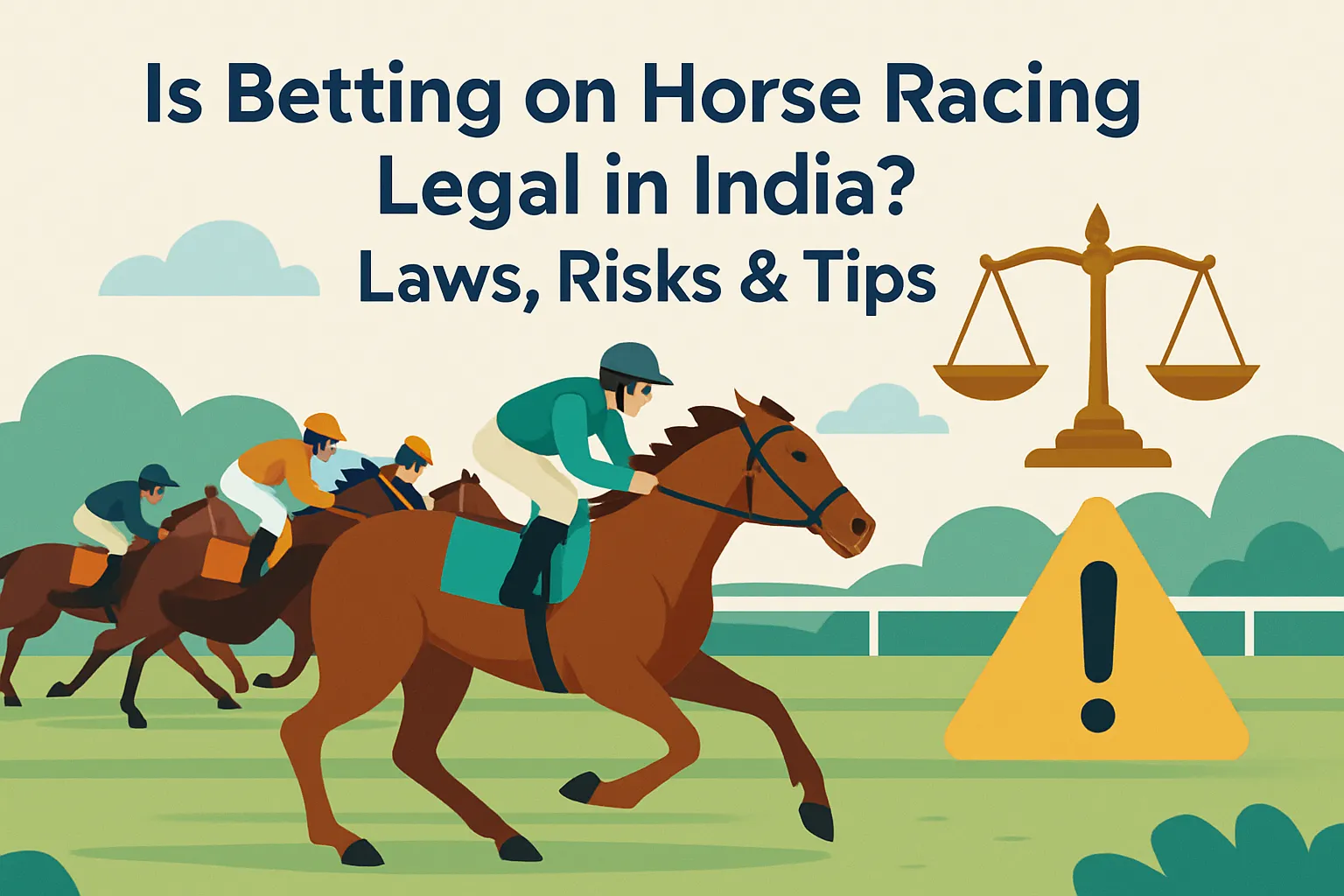Countless spectators in India still crowd tracks such as Mahalaxmi and Bangalore, drawn by the thundering hooves and fragrant clouds of grass. Indian racing carries with it not only prestige but also the abiding enigma of whether a simple money wager is lawful. Public curiosity quickly turns to legal, financial, and ethical consequences once the question lands. So, let’s find the answer to “Is horse racing betting legal in India”, about which many of the folks are curious to know.
This article intends to break down Indian gambling laws for horse racing wagers, examine the distinct risks of online horse betting in India, and offer practical tips for punters who wish for safe horse betting practices in India.
Is Horse Racing Betting Legal in India? – Legal Scenario
Legal approval exists, provided specific boxes are ticked and certain grey areas avoided. Betting is deemed permissible once the event is classified as an authorised race, the organisers hold a state-issued licence, and the outcome is dictated by animal speed rather than human intervention.
Legal consensus rests on one pivotal distinction: observers almost unanimously classify horse racing as a game of skill, not of pure chance. That perspective gained formal stature in the 1996 Supreme Court ruling, Dr. K.R. Lakshmanan v. State of Tamil Nadu; the justices insisted that wagering on the turf demands extensive background knowledge, predictive judgment, and comparative analysis. By contrast, the Court firmly separated racing bets from the unfettered randomness found in roulette spins or lottery drawings.

Indian gambling laws for horse racing
To understand the scenario of legalities of horse racing gambling, we need to first go through the Indian gambling laws for horse racing which are governed by:
The Public Gambling Act of 1867: A wider frame-of-reference emerges once we inspect the patchwork of Indian statutes that regulate turf gambling. The Public Gambling Act of 1867 lays down a blanket ban on proprietors of public betting houses, yet the statute quietly exempts activities defined as games of skill.
The Prize Competitions Act, 1955: The Prize Competitions Act, passed three decades later, echoes that sentiment and forthrightly distinguishes games of skill from those purely reliant on chance.
State-Specific Legislation: Because gambling policy remains a matter reserved for the states, regional assemblies enjoy latitude to craft their own rules. Turf clubs in jurisdictions such as Maharashtra, Karnataka, or West Bengal operate licensed betting windows and tote boards that remain perfectly legal under the local frameworks.
So, the answer to “Is horse racing betting legal in India? – is yes, but via a licensed track bookmaker or a registered pari-mutuel system and the answer is an unequivocal yes.
Online Betting on Horse Racing in India: Grey Zone Report!
Offline wagering conducted on course sits within clear regulatory boundaries, yet web-based online betting activities fall in the grey area. According to Indian policies, online betting drifts into legislative uncertainty rather than outright illegality or enforceable legality.
National statutes neither endorse nor explicitly forbid online gaming, leaving a policy vacuum that several state assemblies have filled with divergent provisions. Telangana and Andhra Pradesh, for example, have enacted explicit prohibitions that cover all forms of internet gambling, while jurisdictions such as Maharashtra simply ignore the subject.
This patchwork enables numerous foreign betting operators to market their services in India without fear of domestic legal consequences. Punters who choose to use these offshore platforms can sometimes achieve quick action and better odds, but they remain liable to currency risk, unresolved tax questions, and the possibility of abrupt account closure by the bookmaker.
Risks of Online Horse Betting in India
Placing a wager on a virtual racetrack can feel strangely effortless, yet that very simplicity hides a tangle of potential pitfalls. A close look at the practice and risks of online horse betting in India.
Legal Uncertainty
The legal framework governing online gambling in India remains murky at best. Although many jurisdictions classify horse racing as a game of skill, betting via an unlicensed international site may still expose punters to local statutes they do not fully understand.
Fraudulent Platforms
A quick web search produces dozens of operators that boast generous odds and smooth interfaces, but the fine print often evaporates when money changes hands. Unscrupulous outfits have been known to rig results, inflate balances or simply vanish once they have harvested a players deposit.
Data Theft & Cybersecurity
Entering a name, address and bank detail on a betting portal is an open invitation to cybercriminals if that portal lacks up-to-date encryption. News headlines about hacked databases and stolen identities crop up with alarming regularity, reminding users that personal data is worth far more than any single winning slip.
Financial Risks & Addiction
One-click betting paired with 24-hour accessibility can blur the line between recreation and obsession in a flash. Gamblers who chase losses or place impulsive wagers from a midnight smartphone rarely see the full picture until a bank statement arrives, often accompanied by a creeping sense of regret.
Safe Horse Betting Practices in India
Wagering on the ponies can be exhilarating, yet it should never feel reckless. Whether you gather dust at the rails or tap a screen in the comfort of home, these safe horse betting practices in India are sensible habits that will guard both wallet and equanimity.
-
Bet Through Authorized Turf Clubs
A ticket is more than a slip of paper; it is a receipt of regulatory oversight. Place your cash only with licensed bookmakers at clubs such as the Royal Western India Turf Club, Bangalore Turf Club, Hyderabad Race Club, or Madras Race Club. Their operations fall under formal state scrutiny, which furnishes a layer of accountability seldom found in the informal betting scene.
-
Research Before Betting
Horse racing, for all its pageantry, is largely a contest of compiled statistics and turfcraft. Read the form, scan jockey strike rates, and note how the ground is likely to ride on race day. Decisions rooted in data will nearly always outpace those made on impulse or crowd speculation.
-
Set a Budget and Stick to It
Discipline trumps luck in the long run. Allocate a fixed sum for betting and treat it as entertainment money, never as capital that must be recouped. Chasing losses is a one-way ticket to frustration and, more seriously, to irresponsible expenditure.
-
Use Reputed Online Platforms (With Caution)
The mouse-clicking equivalent of stepping behind the tote-board can still expose punters to danger. Verify that the website is licensed, read user reviews, and check how quickly winnings are settled. Always log on via a secure connection, and avoid public Wi-Fi; an unsecured network is an open invitation for prying eyes.
-
Stay Updated on State Laws
Indian gambling laws for horse racing are famously patchy, and that patchiness somehow impacts on horse-racing wagering. Regulation can shift from Tamil Nadu to Tripura overnight, so a quick scan of your state statutes is a sensible first move. It does not matter whether you are on a desktop website or standing at a dusty local track; the law that counts is the one where you are physically located.
The Role of Technology and Regulation
Foot races were betting targets long before the desktop, let alone the smartphone, was even a gleam in a programmers eye. Yet that same legacy sport now sits at a crossroads marked with fiber-optic cables and cloudy legal language. Policymakers face three urgent tasks: spell out how the Penal Code applies when odds are streamed in real time, impose tough guardrails on the platforms that present those odds, and promote responsible-gambling habits that prevent excitement from drifting into addiction.
Conclusion
Is horse racing betting legal in India? Yes, if you stick to official bookmakers and, more to the point, obey the rules of your home state. Courts have classified horse-race betting as a skill game, which gives the market a legal foundation most other forms of wagering lack. That said, the rapid rise of web-only operators has injected new headaches, from cyber-security gaps to questions about consumer fairness.
A smart punter reads the fine print, weighs the obvious risks, and moves only when the legal ground feels solid beneath the feet. By understanding Indian gambling laws for horse racing, acknowledging the risks of online horse betting in India, and adopting safe horse betting practices in India. Do all that, and the roar of the crowd is still just a mouse-click away.

